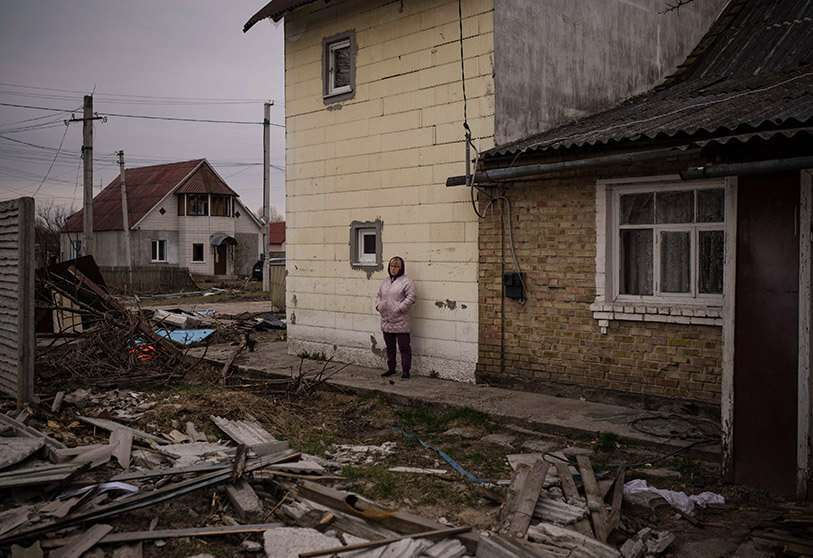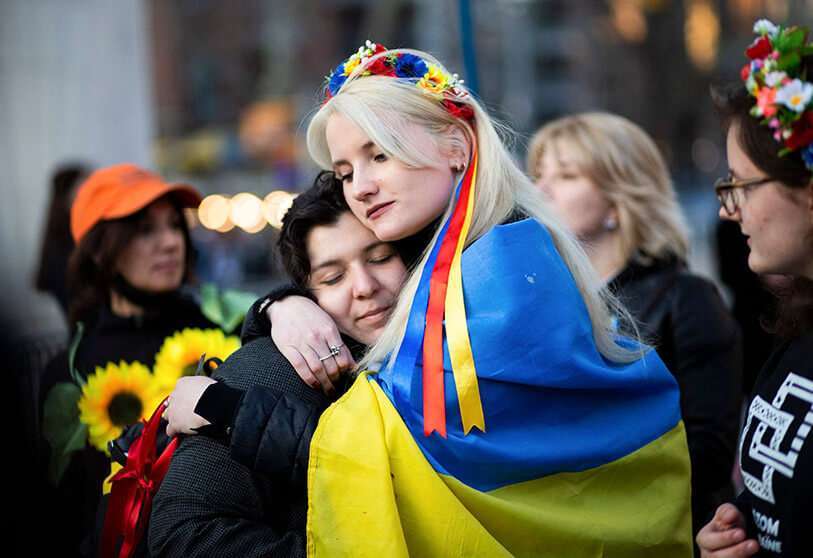Ukraine, another example of women as spoils of war

In military conflicts, women suffer a double victimisation. To the horror of the consequences of war, in the case of both women and girls, are added rape and sexual assault. Ukraine, like many other countries that have experienced military conflict, is witness to this.
We are entering the 49th day of the Russian invasion. As Russian troops begin to withdraw to concentrate their efforts in the Donbas area, the damage of the war is beginning to show. In addition to the horror and deaths, the rape of women has begun to come to light, demonstrating that women continue to be spoils of war regardless of the legal frameworks in place to criminalise such assaults or the advances in human rights themselves.

In wars, human rights are forgotten, and in the case of women the damage is doubled. Ukrainian President Volodomir Zelensky has denounced "hundreds of rapes of even young girls, including babies" as victims of such acts since the Russian invasion of the occupied areas began. Zelensky's words are echoed by the mayor of Bucha, who has reported "the sexual abuse of 25 young Ukrainian girls in one month".
These statements have been reiterated by the Ukrainian public defender, Liudmila Denisova, who denounced the existence of a basement located in Bucha where these 25 women, aged between 14 and 24, are being held hostage. Nine of them are currently pregnant as a result of constant rapes by the Russians. Denisova added that "Russian soldiers told them that they would rape them in such a way that they would not want to have sex with any man in order to prevent them from having Ukrainian children".

The denunciations as well as the statements recounting these crimes are multiplying. The president of the organisation Strada Ukraine, Kateryna Cherepakha, denounced that "we know that many of these cases will never be discovered. Many are killed by Russian soldiers, but we want you to know that rape is being used as a weapon of war in Ukraine".

She said that the organisation's hotline receives calls every day reporting sexual abuse by Russians, "it is just the tip of the iceberg", she said.
On the other hand, UN women's executive director Sima Bahous says that "more and more reports of rape and other abuses are being received". "The combination of mass displacement with a large presence of recruits and mercenaries, and the brutality shown against Ukrainian civilians has set off alarm bells".

Alerted from the outset that they could be victims of rape, many of them opted to shave their hair to pass themselves off as men. Others decided to flee as refugees to escape the barbarity. However, this is not a guarantee of their salvation either, as many of them have fallen into sex trafficking networks or have been deceived for this purpose.
Indeed, rape has become so normalised in conflict that perpetrators are rarely prosecuted. It is part of the context, just as killing is part of the context. In this case, rape is carried out with the simple aim of doing as much harm as possible. Women are often seen, like land, as territories to be conquered. In other conflicts, such as in Rwanda, high-ranking military officials themselves called on their soldiers to rape women as a demonstration of power.

Also, depending on the country and its idiosyncrasies, women are often a reflection of family honour. Should they suffer "dishonour", i.e. rape, they not only suffer the ravages of sexual abuse but are cast out and ignored by their own families.
Added to this is the very conception of women as "men's property". Different analysts indicate that this thinking perpetuates rape. The US researcher focusing on gender and security issues, Carol Cohn, noted in her book "Women and Wars" that "the patriarchal view of women as the property of men subscribes to the notion that rape is simply part of the legitimate rewards of war: the winners would be entitled to take their opponents' women, just as they plunder other property".

She further notes that another reason these attacks are perpetuated is because "rape is intentionally used to terrorise and demoralise civilian communities in an attempt to put pressure on them to stop supporting rival groups or to force them to leave the area".
In addition to the trauma of the act itself, rape has both physical and psychological consequences in the long term. In this regard, the physical consequences themselves range from injuries or sexually transmitted diseases to unwanted pregnancies. They also involve serious damage to women's bodies, such as tearing or abrasions.

On the other hand, on a psychological level, these acts lead to disorders that are long-lasting. This is the case of post-traumatic stress disorder and depressive disorders which can have fatal consequences if they are not treated by a specialist.
It is for this reason that many organisations are calling for women who have been victims of these attacks to be able to access health centres, free of charge and freely, especially those who do not have the necessary resources to do so. However, they denounce the fact that only a small number of these victims obtain the relevant medical services, which makes the problem worse, protected by impunity and the difficulty in verifying that these acts have been committed.

War is the ultimate representation of dehumanisation. The human, economic and social consequences are dire, but in this case, women suffer greater harm. Conflicts continue to show the worst of humanity and sometimes bring out social problems that continue to exist even in the most democratic societies. In the case of wars and women, many problems that only affect women (at least in most cases) continue to remain invisible. The reasons for this silence are multiple and need to be analysed, but in the end, the greatest victims continue to be the same in a borderline scenario in which gender inequality reaches its maximum representation.







